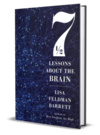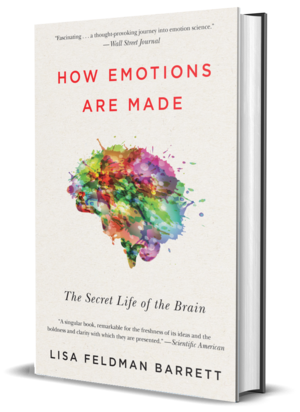Home
Extended endnotes for How Emotions are Made
This site accompanies the book How Emotions are Made: The Secret Life of the Brain (Houghton Mifflin Harcourt, 2017). Here you can find:
- Extended, technical endnotes (use the search box)
- End matter (bibliography, notes, etc.) that was omitted from the audiobook and some translated editions
- Glossary of terms
- Errata
- Help with this website
This site is not a standalone reference on emotion, however. You'll need the book to understand the material fully.
Seven and a Half Lessons About the Brain

Seven and a Half Lessons About the Brain is also available! It's a collection of short essays about your brain and how it makes you human. Call it the world's first neuroscience “beach read.”
Locating endnotes
If the book refers you a web endnote like this:
- heam.info/something
enter that "something" in the search box above. For example, if the book directs you to heam.info/affect-1, then search for affect-1.
Enjoy!
Praise for How Emotions are Made
"How Emotions are Made did what all great books do. It took a subject I thought I understood and turned my understanding upside down."
— Malcolm Gladwell, bestselling author of David and Goliath and Outliers
"A brilliant and original book on the science of emotion, by the deepest thinker about this topic since Darwin."
— Daniel Gilbert, best-selling author of Stumbling on Happiness
"Barrett's is a singular book, remarkable for the freshness of its ideas and the boldness and clarity with which they are presented."
—Scientific American Mind, May 2017
"Fascinating... If you want to read emotions better, read this book."
—Harper's Bazaar, March 2017
"Ms. Barrett writes clearly, with compelling examples and stories, and helps bring us all up to speed on most of the major developments in the field of emotion studies. [Her] book is a thought-provoking journey into emotion science."
— Wall Street Journal, March 5, 2017
STARRED REVIEW. “Prepare to have your brain twisted around as psychology professor Barrett takes it on a tour of itself. Her enthusiasm for her topic brightens every amazing fact and theory about where our emotions come from.”
— Booklist Reviews, February 15, 2017
"FIVE STARS. The depth with which Barrett describes [the nature of emotion] is truly remarkable. [She] ties together the many facets of emotional concerns and makes them accessible to the average reader. [...] Down-to-earth and a delight to read."
— Seattle Book Review, March 2017
"[Barrett's] book, chock-full of startling, science-backed findings, is an entertaining and engaging read."
— Forbes, March 8, 2017
STARRED REVIEW. "[Barrett] presents a new neuroscientific explanation of why people are more swayed by feelings than by facts. She offers an unintuitive theory that goes against not only the popular understanding but also that of traditional research: emotions don’t arise; rather, we construct them on the fly. Furthermore, emotions are neither universal nor located in specific brain regions; they vary by culture and result from dynamic neuronal networks. These networks run nonstop simulations, making predictions and correcting them based on the environment rather than reacting to it. Tracing her own journey from the classical view of emotions, Barrett progressively builds her case, writing in a conversational tone and using down-to-earth metaphors, relegating the heaviest neuroscience to an appendix to keep the book accessible. Still, it is a lot to take in if one has not been exposed to these ideas before. VERDICT: The theories of emotion and the human brain set forth here are revolutionary and have important implications. For readers interested in psychology and neuroscience as well as those involved in education and policy."
— Library Journal, January 2017
STARRED REVIEW. "A well-argued, entertaining disputation of the prevailing view that emotion and reason are at odds. [Barrett contents that] we are responsible for our individual actions, of course, but we also bear responsibility for working to eliminate racial prejudice, gender stereotyping, and the like from our society.... [This] has important legal as well as moral implications and leads into the thorny questions surrounding free will. A highly informative, readable, and wide-ranging discussion."
— Kirkus Reviews, January 2017
"Most of us make our way through the world without thinking a lot about what we bring to our encounters with it. Lisa Feldman Barrett does—and what she has to say about our perceptions and emotions is pretty mind-blowing."
— Elle, March 2017
"This meticulous, well-researched, and deeply thought out book reveals new insights about our emotions—what they are, where they come from, why we have them. For anyone who has struggled to reconcile brain and heart, this book will be a treasure; it explains the science without short-changing the humanism of its topic."
— Andrew Solomon, best-selling author of Far From the Tree and The Noonday Demon
"Ever wonder where your emotions come from? Lisa Barrett, a world expert in the psychology of emotion, has written the definitive field guide to feelings and the neuroscience behind them."
— Angela Duckworth, best-selling author of Grit
"We all harbor an intuition about emotions: that the way you experience joy, fear or anger happens automatically and is pretty much the same as a Kalahari hunter-gatherer. In this excellent new book, Lisa Barrett draws on contemporary research to offer a radically different picture: that the experience of emotion is highly individualized, neurobiologically idiosyncratic, and inseparable from cognition. This is a provocative, accessible, important book."
— Robert Sapolsky, author of Why Zebras Don't Get Ulcers and A Primate's Memoir
"Everything you thought you knew about what you feel and why you feel it turns out to be stunningly wrong. Lisa Barrett illuminates the fascinating new science of our emotions, offering real-world examples of why it matters in realms as diverse as health, parenting, romantic relationships and national security."
— Peggy Orenstein, author of Girls & Sex
"After reading How Emotions Are Made, I will never think about emotions the same way again. Lisa Barrett opens up a whole new terrain for fighting gender stereotypes and making better policy."
— Anne-Marie Slaughter, author of Unfinished Business
"What if everything you thought you knew about lust, anger, grief, and joy was wrong? Lisa Barrett is one of the psychology’s wisest and most creative scientists and her theory of constructed emotion is radical and fascinating. Through vivid examples and sharp, clear prose, How Emotions are Made defends a bold new vision of the most central aspects of human nature."
— Paul Bloom, author of Against Empathy and How Pleasure Works
"Lisa Barrett writes with great clarity about how your emotions are not merely about what you're born with, but also about how your brain pieces your feelings together, and how you can contribute to the process. She tells a compelling story."
— Joseph LeDoux, author of Anxious and Synaptic Self
"How Emotions Are Made offers a grand new conception of emotions—what they are, where they come from, and (most importantly) what they aren’t. Brain science is the art of the counterintuitive and Lisa Barrett has a remarkable capacity to make the counterintuitive comprehensible. This book will have you smacking your forehead wondering why it took so long to think this way about the brain."
— Stuart Firestein, author of Failure: Why Science is So Successful and Ignorance: How It Drives Science
"How Emotions Are Made is a provocative, insightful, and engaging analysis of the fascinating ways that our brains create our emotional lives, convincingly linking cutting edge neuroscience studies with everyday emotions. You won't think about emotions in the same way after you read this important book."
— Daniel L. Schacter, author of The Seven Sins of Memory
"Lisa Barrett masterfully integrates discoveries from affective science, neuroscience, social psychology, and philosophy to make sense of the many instances of emotion that you experience and witness each day. How Emotions are Made will help you remake your life, giving you new lenses to see familiar feelings—from anxiety to love—anew."
— Barbara Fredrickson, author of Positivity and Love 2.0
"Every lawyer and judge doing serious criminal trials should read this book. We all grapple with the concepts of free will, emotional impulses, and criminal intent, but here these topics are exposed to a new scrutiny and old assumptions are challenged. The interface of law and brain science is suddenly the area we ought to be debating."
— Baroness Helena Kennedy, QC, House of Lords, U.K.
"Extraordinarily well written, Lisa Barrett’s How Emotions are Made chronicles a paradigm shift in the science of emotion. But more than just a chronicle, this book is a brilliant work of translation, translating the new neuroscience of emotion into understandable and readable terms. Since that science has profound implications in areas as disparate as police shootings and TSA profiling, the translation is critical for scientists and citizens, lawmakers and physicians. (For example, what if there is no meaningful scientific difference between premeditated murder, the product of rational thought, which we consider most culpable, and the lesser offense of manslaughter, a 'crime of passion?') Emotions do not reside in dedicated brain areas, constantly at war with areas charged with cognition or perception, as Pixar caricatured it in Inside Out, let alone the brain described by Descartes or Plato or other philosophers. Nor does the brain passively retrieve data from 'outside' to which it reacts. The brain constructs the reality it perceives, and the emotions it (and we) experience, using core brain systems, not specialized circuits. And it does so in concert with other brains, with the culture surrounding it. The implications of this work ('only' challenging two thousand year old assumptions about the brain) and its ambitions are nothing short of stunning. Even more stunning is how extraordinarily well it succeeds."
— Nancy Gertner, Senior Lecturer on Law, Harvard Law School, and former U.S. federal judge for the United States District Court of Massachusetts
“How Emotions are Made is a Tour de Force in the quest to understand how we perceive, judge and decide. It lays the groundwork to address many of the mysteries of human behavior. I look forward to how this more accurate view of emotion will help my clients in athletics and trading.”
— Denise K. Shull, MA, Founder and CEO, The ReThink Group
"With How Emotions Are Made, Lisa Feldman Barrett has set the terms of debate for emotion theory in the 21^st century. In clear, readable prose, she invites us to question both lay and expert understandings of what emotions are—and she musters an impressive body of data to suggest new answers. Barrett’s theory of how we construct emotions has major implications for law, including the myth of dispassionate judging. Her “affective science manifesto for the legal system” deserves to be taken seriously by theorists and practitioners alike."
— Terry A. Maroney, Professor of Law, Vanderbilt University
